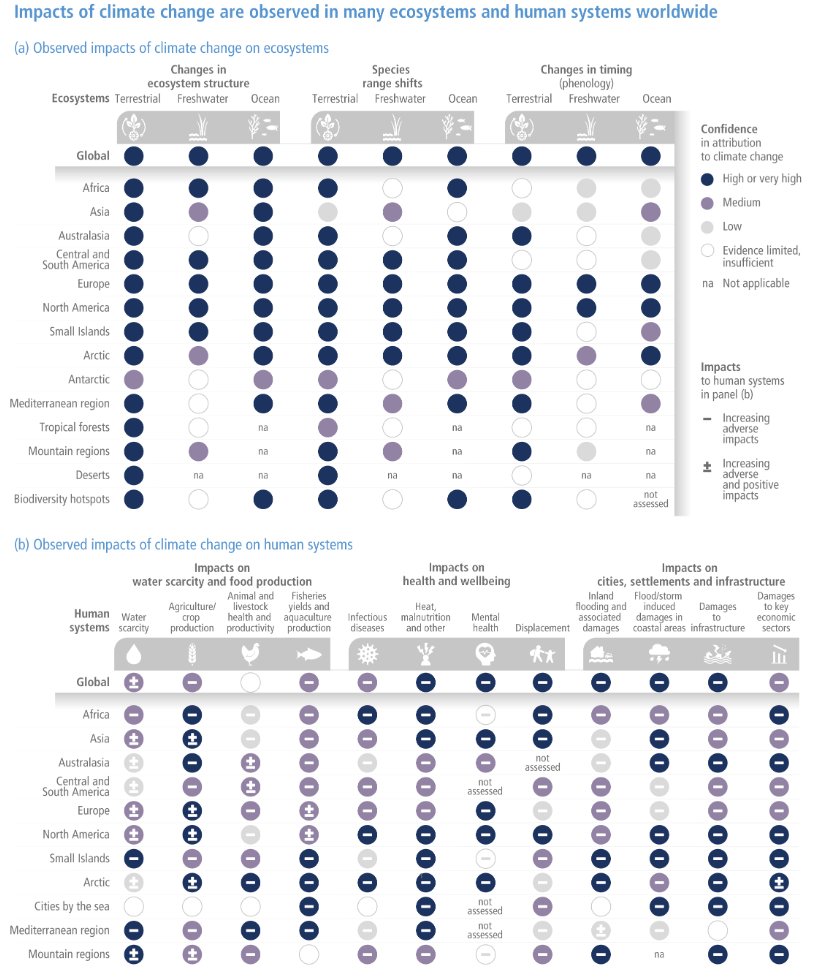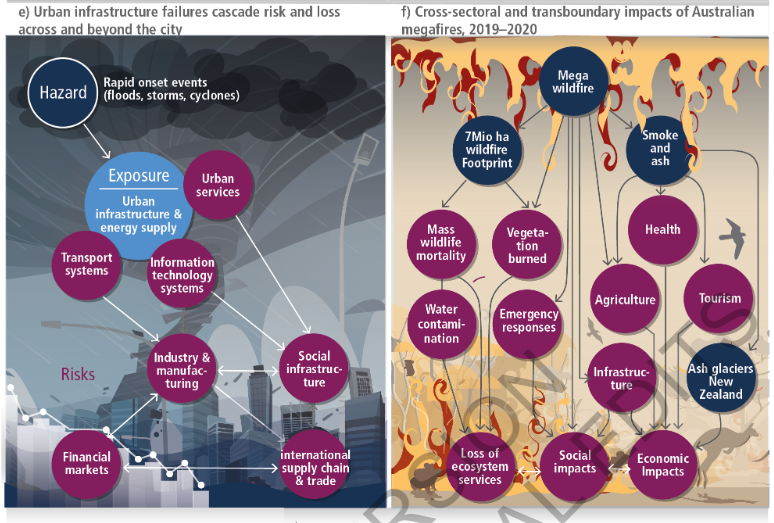
The IPCC Climate Change 2022: Impacts, Adaptation and Vulnerability was released today. I'm going to go through the executive summary and post some "highlights". #IPCC #IPCCReport
report.ipcc.ch/ar6wg2/pdf/IPC…
report.ipcc.ch/ar6wg2/pdf/IPC…
Risk can arise from the dynamic interactions among climate-related hazards,exposure & vulnerability of affected human & ecological systems. Risk that can be introduced by human responses to #climatechange is a new consideration in the risk concept. There are 127 key risks. 

Observed Impacts from Climate Change:
" The rise in weather and climate extremes has led to some irreversible impacts as natural and human systems are pushed beyond their ability to adapt"
" The rise in weather and climate extremes has led to some irreversible impacts as natural and human systems are pushed beyond their ability to adapt"
These include increased heat-related human mortality, warm-water coral bleaching and mortality, and increased drought-related tree mortality. increases in areas burned by wildfires. Impacts from tropical cyclones. Ocean acidification, sea-level rise, and droughts. #climatechange
The extent and magnitude of climate change impacts are larger than estimated in previous assessment. The #climatecrisis has caused substantial damages, and increasingly irreversible losses, in terrestrial, freshwater and coastal and open ocean marine ecosystems
Widespread deterioration of #ecosystem structure and function, resilience and natural adaptive capacity, and shifts in seasonal timing.
Half of the species assessed globally have shifted polewards or, on land, also to higher elevations
Half of the species assessed globally have shifted polewards or, on land, also to higher elevations
Some losses are already irreversible, such as the first species extinctions driven by climate change.
Observed global and regional impacts on ecosystems and human systems attributed to climate change. #Climatechange has already had diverse adverse impacts on human systems. 

#ExtremeWeather & Impacts:
- reduced food & water security
- #OceanWarming & #acidification have affected food production (Shellfish & fisheries)
- millions of people exposed to acute food insecurity, reduced water security [half of the world’s population]
-increased malnutrition
- reduced food & water security
- #OceanWarming & #acidification have affected food production (Shellfish & fisheries)
- millions of people exposed to acute food insecurity, reduced water security [half of the world’s population]
-increased malnutrition
Physical Health #climatechange
- extreme heat events result in human mortality/morbidity
- climate-related food-borne and water-borne⬆️
- Disease range & reproduction⬆️
- Diseases emerging in new areas
- Neurotoxic freshwater cyanobacteria ⬆️
- extreme heat events result in human mortality/morbidity
- climate-related food-borne and water-borne⬆️
- Disease range & reproduction⬆️
- Diseases emerging in new areas
- Neurotoxic freshwater cyanobacteria ⬆️
Physical & Mental Health
- trauma from weather &climate extreme events
- loss of livelihoods and culture
- exposure to wildfire smoke, atmospheric dust, & aeroallergens = cardiovascular and respiratory distress
- Health services have been disrupted
- trauma from weather &climate extreme events
- loss of livelihoods and culture
- exposure to wildfire smoke, atmospheric dust, & aeroallergens = cardiovascular and respiratory distress
- Health services have been disrupted
Urban Areas
- heatwaves have intensified in cities
- aggravated air pollution
- transportation, water, sanitation & energy systems have been compromised
- heatwaves have intensified in cities
- aggravated air pollution
- transportation, water, sanitation & energy systems have been compromised
#HumanitarianCrisis Impacts
- driving displacement in all regions
- Flood and drought-related acute food insecurity and malnutrition
-perpetuated vulnerability
#climatecrisis #massmigrations
- driving displacement in all regions
- Flood and drought-related acute food insecurity and malnutrition
-perpetuated vulnerability
#climatecrisis #massmigrations
Vulnerability & Exposure of Ecosystems & People
- 3.3 to 3.6 billion people live in contexts that are highly vulnerable to climate change
-A high proportion of species is vulnerable to climate change
- Human & ecosystem vulnerability are interdependent
- 3.3 to 3.6 billion people live in contexts that are highly vulnerable to climate change
-A high proportion of species is vulnerable to climate change
- Human & ecosystem vulnerability are interdependent
Unsustainable ecosystem engagement:
- #Unsustainable land-use & land cover change, unsustainable use of natural resources, #deforestation, loss of biodiversity, pollution impact capacities of ecosystems, societies, communities & individuals to adapt to #climatechange
- #Unsustainable land-use & land cover change, unsustainable use of natural resources, #deforestation, loss of biodiversity, pollution impact capacities of ecosystems, societies, communities & individuals to adapt to #climatechange
Loss of ecosystems & their services has cascading and long-term impacts.
Non-climatic human-induced factors exacerbate current ecosystem vulnerability.
Even within protected areas, unsustainable use of natural resources, habitat fragmentation, & ecosystem damage by pollutants
Non-climatic human-induced factors exacerbate current ecosystem vulnerability.
Even within protected areas, unsustainable use of natural resources, habitat fragmentation, & ecosystem damage by pollutants
Less than 15% of the land, 21% of the freshwater and 8% of the ocean are protected areas
Insufficient #stewardship to contribute to reducing damage from, or increasing resilience to, climate change
Insufficient #stewardship to contribute to reducing damage from, or increasing resilience to, climate change
Risks in the near term (2021-2040):
- unavoidable increases in multiple climate hazards & present multiple risks to ecosystems & humans
- many terrestrial, freshwater, coastal & marine ecosystems at high or very high risks of biodiversity loss
- unavoidable increases in multiple climate hazards & present multiple risks to ecosystems & humans
- many terrestrial, freshwater, coastal & marine ecosystems at high or very high risks of biodiversity loss
- Continued and accelerating #SeaLevelRise will encroach on coastal settlements & infrastructure
- commit low-lying coastal ecosystems to submergence and loss
- number of people at risk from climate change & associated loss of biodiversity will progressively increase
- commit low-lying coastal ecosystems to submergence and loss
- number of people at risk from climate change & associated loss of biodiversity will progressively increase
Many of these risks are unavoidable in the near-term, irrespective of emission scenario (high confidence).
Widespread, pervasive, & potentially irreversible impacts at global warming levels of 1.5–2°C if exposure and vulnerability are high and adaptation is low.
#ClimateCrisis
Widespread, pervasive, & potentially irreversible impacts at global warming levels of 1.5–2°C if exposure and vulnerability are high and adaptation is low.
#ClimateCrisis
Mid to Long-term Risks (2041–2100)
For 127 identified key risks, assessed mid-and long-term impacts are up to multiple times higher than currently observed #ClimateCrisis #ClimateReport #Collapse
For 127 identified key risks, assessed mid-and long-term impacts are up to multiple times higher than currently observed #ClimateCrisis #ClimateReport #Collapse
Up to 14% of species assessed will likely face very high risk of extinction at global warming levels of 1.5°C, increasing up to 18% at 2°C, 29% at 3°C, 39% at 4°C, 48% at 5°C. #massextinction #extinction #Collapse
#Water Risks
- physical water availability & water-related hazards will continue to increase
- At 2°C snowmelt water availability for irrigation is projected to decline up to 20%
- increases in direct flood damages are higher by up to 2 times at 2°C & 3.9 times at 3°C compared
- physical water availability & water-related hazards will continue to increase
- At 2°C snowmelt water availability for irrigation is projected to decline up to 20%
- increases in direct flood damages are higher by up to 2 times at 2°C & 3.9 times at 3°C compared
#Food Risk
- droughts, floods and heatwaves, & continued sea level rise increase risks to food security
- malnutrition & micro-nutrient deficiencies
- #climatechange weakens soil health and ecosystem services such as pollination
- more pests & diseases
- undermine food production
- droughts, floods and heatwaves, & continued sea level rise increase risks to food security
- malnutrition & micro-nutrient deficiencies
- #climatechange weakens soil health and ecosystem services such as pollination
- more pests & diseases
- undermine food production
Health Risk
- significantly increase ill health and premature death
- food-borne, water-borne, & vector-borne #disease risks ⬆️
1/
- significantly increase ill health and premature death
- food-borne, water-borne, & vector-borne #disease risks ⬆️
1/
• • •
Missing some Tweet in this thread? You can try to
force a refresh






